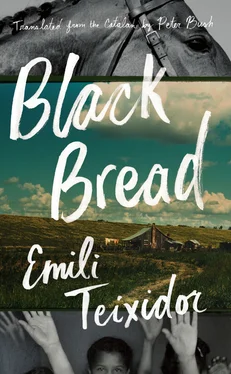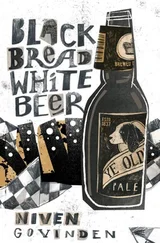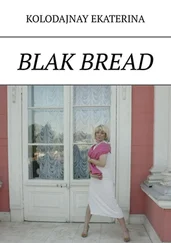Emili Teixidor - Black Bread
Здесь есть возможность читать онлайн «Emili Teixidor - Black Bread» весь текст электронной книги совершенно бесплатно (целиком полную версию без сокращений). В некоторых случаях можно слушать аудио, скачать через торрент в формате fb2 и присутствует краткое содержание. Год выпуска: 2016, Издательство: Biblioasis, Жанр: Современная проза, на английском языке. Описание произведения, (предисловие) а так же отзывы посетителей доступны на портале библиотеки ЛибКат.
- Название:Black Bread
- Автор:
- Издательство:Biblioasis
- Жанр:
- Год:2016
- ISBN:нет данных
- Рейтинг книги:3 / 5. Голосов: 1
-
Избранное:Добавить в избранное
- Отзывы:
-
Ваша оценка:
- 60
- 1
- 2
- 3
- 4
- 5
Black Bread: краткое содержание, описание и аннотация
Предлагаем к чтению аннотацию, описание, краткое содержание или предисловие (зависит от того, что написал сам автор книги «Black Bread»). Если вы не нашли необходимую информацию о книге — напишите в комментариях, мы постараемся отыскать её.
Born in 1933,
's first novel,
, was published to tremendous acclaim in 1988, followed by several more which established him as one of Spain's greatest contemporary authors.
Black Bread — читать онлайн бесплатно полную книгу (весь текст) целиком
Ниже представлен текст книги, разбитый по страницам. Система сохранения места последней прочитанной страницы, позволяет с удобством читать онлайн бесплатно книгу «Black Bread», без необходимости каждый раз заново искать на чём Вы остановились. Поставьте закладку, и сможете в любой момент перейти на страницу, на которой закончили чтение.
Интервал:
Закладка:
“Tell them the horse was mine and let them turn their fire on me. That I brought it down from the mountains. That it was a breed from the Pyrenees I wanted to transplant down here. That I was bringing it with the flock when it wandered off, as lots of animals do…”
Dad Quirze said nothing. When Grandfather Hand noticed we’d come to a halt and were listening, he raised his stick and waved it threateningly at us: “So what are you three doing here? Clear off to class, you don’t deserve the crumbs on your plate! Beat it, and quick, or I’ll set the dogs on you.”
Several days went by before we got back on friendly terms with Oak-Leaf and she walked back with us after school. We’d fallen out over something silly, or she and Quirze had had one of their squabbles. And then she always found excuses not to come with us: one day she left class later, another she had to run an errand in the village, on yet another she dilly-dallied chatting with her girlfriends by the exit. Walking home without her wasn’t such fun. If she wasn’t there, we didn’t fancy going into the woods to hunt crickets, pick herbs or tell stories. It was if something was missing in the woods — her voice perhaps.
One afternoon, when the scent of spring was in the air, though the weather still wasn’t fine enough for us to climb our plum tree again, Cry-Baby stayed behind in class because the teacher wanted her to do a test to see if she could change class, leave the tiny tots and join us; she seemed big enough and advanced enough in her schoolwork.
While we were waiting, Quirze and I amused ourselves playing a game of marbles with a couple of friends, Gamundi and someone else. Oak-Leaf was chatting to some girls, and from time to time she looked round and glanced our way out of the corner of her eye, as if waiting for us to leave so she could follow. However, that may just have been a hunch of mine, because we’d not walked home together with Oak-Leaf for days.
When Cry-Baby finally appeared, Quirze and I couldn’t leave the game and we told her to wait a moment, we were winning. A minute would do it.
Oak-Leaf left the other girls to go and say hello to Cry-Baby. They sat down on the roadside and chatted while we finished our game.
“Let’s go,” shouted Quirze, standing up and stuffing the marbles we’d won into his pocket.
Oak-Leaf and Cry-Baby got to their feet as well, and I did too. Pleased with our winnings, Quirze walked on ahead, not aware of Oak-Leaf silently bringing up the rear.
“Got over your tantrum?” he finally asked when he turned his head and saw her.
Oak-Leaf said nothing.
“And what about you?” he asked Cry-Baby. “What did the teacher say?”
“That she’ll join our class,” replied Oak-Leaf, anticipating her answer. “She may have to stay behind on other days, because the teacher wants to give her extra lessons by herself so she can catch up. She’s a big girl now and will be joining us. She’ll take her First Communion this year.”
“She’s big is she, this jenny-wren, this runt?” rasped Quirze, not even bothering to look behind him. “Can’t you see how she’s stuck for words when she’s asked a simple question? Have you swallowed your tongue, or do other people have to speak up for you?”
Cry-Baby said nothing. Oak-Leaf glanced at me as if to say my cousin’s tone of voice indicated he was raring for a fight.
We walked silently along the track. After a while, when we were nearing the turning into the woods, the spot where Oak-Leaf went her way, she lowered her voice, as if saying something unimportant: “Núria’s tired. She should take a rest before she goes home.”
Initially we were surprised to hear Cry-Baby’s real name that we never used.
“Tired?” grimaced Quirze, stopping in his tracks. We all followed suit, and waited for her to react.
“The teacher gave her a dictation and a decimal division and she got into a bit of a state,” Oak-Leaf continued in the same vein, as if speaking up for the younger girl. “She’s upset.”
“Upset? What do you mean ‘she’s upset’?” asked Quirze, apparently more surprised than ever.
“She’s a bit scared.”
“What’s up with the ninny?”
Oak-Leaf hesitated for a second. “She’s scared of the teacher of the big class, Mr. Madern… She’s worried about changing class and mates… She’s scared of joining the class with the big kids. She’s afraid they’ll give her the evil eye.”
“She’ll get over that. If she wants to be a big girl, she’ll have to learn to handle teething problems.”
Quirze turned round to walk off down the path, but Oak-Leaf dropped Cry-Baby’s hand and positioned herself in front of him as if to block his way, in a friendly way, not at all aggressively, and she implored him: “Quirze…”
We were astonished to see Quirze look at her calmly, quietly intrigued by the way she continued with that begging tone.
“Quirze… Núria’s not feeling well. Let her rest for a bit.”
Oak-Leaf’s voice sounded eminently reasonable.
“Please, Quirze. I’ll tell you everything I’ve seen in the woods. Whatever you want to know.”
Quirze said nothing and took the turning as if he was leading us into the woods and we all followed.
10
Cry-Baby took First Communion in the chapel in the Saint Camillus monastery. The other farm children taking their First Communion that year did so in the parish church, accompanied by their families, as was obligatory, with the other new communicants in the locality.
It was very hard to get the parish priest to permit that special arrangement. However, Dad Quirze was a tough nut and never softened until he got his own way.
Dad Quirze didn’t want to step foot inside the church or deal with that devious, two-faced priest — his words — and he called on the Father Superior from the Saint Camillus monastery, a squat, ruddy-cheeked Navarrese, to help him. Father Tafalla and Uncle Quirze were friends, got on well, and were involved in stuff that we didn’t understand. The truth, according to Grandmother Mercè, was that Dad Quirze didn’t want to show his face. That was all she ever said: “He doesn’t want to show his face. Quirze is like that, he doesn’t want to be seen and fuel village gossip,” she repeated when someone outside the family asked what was behind his surprising decision.
If the strangers’ questions began to harass, Grandmother gave her answers a further twist: “We don’t know where the girl’s parents are,” she said, “Quirze, my son-in-law, doesn’t want anyone to think he’s assuming the role of his in-laws. If the girl’s parents, Fonso and Mites, were here, there’d be nothing to worry about, but the idea of organizing a First Communion party when we don’t know if her parents are alive or dead upsets him, you must understand that.”
And she added, by way of a weaker argument: “Besides, every Sunday Quirze goes to mass at the Saint Camillus monastery, he doesn’t go to the parish church. You know, he can’t change his habits just like that.”
Of necessity she stated loud and clear that he abided by his Sunday duties that were almost compulsory in those days. Nobody could dodge them. At school, we pupils went to mass every Sunday organized and accompanied by our teacher, Miss Pepita, since Mr. Madern spent the weekends in his house in the city. And we saw how the pupils in the national school did likewise, accompanied by their teachers, a few pews in front. That organized attendance declined over time and we were allowed go to mass by ourselves or with our parents, at any time, morning mass or solemn mass, but on Monday, when we reached school, the master made us say which mass we’d been to, with whom, what was the colour of the celebrant’s chasuble, what was the sermon about, who’d seen us there…as if he was interrogating us. When somebody couldn’t go, for whatever reason, he or she had to bring a note from their parents with an excuse, an illness or a trip, if they didn’t want to suffer the requisite punishment. Control of the adult population was more subtle, but no less efficient. Nobody dared be defiant and openly say they didn’t go to mass, that they didn’t do their duty. Men normally went reluctantly, always to the main, solemn mass, just before aperitifs in the bar on the square, and stood at the back of church and constantly went in and out on the excuse that they were going for a smoke in the entrance or the small square, need a quick drag, they’d say.
Читать дальшеИнтервал:
Закладка:
Похожие книги на «Black Bread»
Представляем Вашему вниманию похожие книги на «Black Bread» списком для выбора. Мы отобрали схожую по названию и смыслу литературу в надежде предоставить читателям больше вариантов отыскать новые, интересные, ещё непрочитанные произведения.
Обсуждение, отзывы о книге «Black Bread» и просто собственные мнения читателей. Оставьте ваши комментарии, напишите, что Вы думаете о произведении, его смысле или главных героях. Укажите что конкретно понравилось, а что нет, и почему Вы так считаете.












